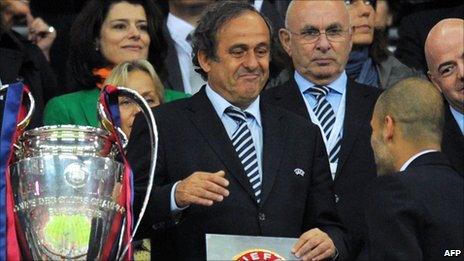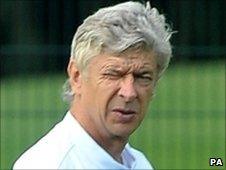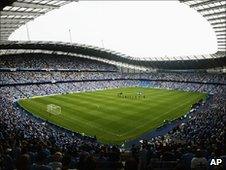Uefa's plan for balanced budgets & level playing fields
- Published

Michel Platini has spearheaded UEFA's plans for financial fair play
Depending on who you are talking to, Uefa's financial fair play (FFP) rules are either an anti-competitive burden cooked up by an out-of-touch regulator or football's last chance to save itself from its worst excesses.
Opinions range - and rage - between these two poles but every leading club in Europe is preparing for life under FFP. Not bad for a set of guidelines still two years away from coming into full effect.
So what exactly does Uefa want? How will these rules work? And who will enforce them?
For answers to these questions - and a few more - I went to the Brussels home of Jean-Luc Dehaene, the man Uefa president Michel Platini says is in charge of European football's economic destiny.
What follows is a mixture of his replies, the FFP rulebook and my analysis.
Q: What is FFP exactly?
A: Uefa wants clubs to balance their books over a three-year period starting from the 2013-14 season but the first season that actually counts is this one, so the initial period under the FFP guidelines is actually two years, not three.
If balanced books sound like a leap for European football's more spendthrift sides (most of them, then) it's because it is, which is why there is plenty of sugar with the FFP medicine.
First, the move towards what Dehaene calls "equilibrium" will be phased in over at least six years. Clubs will be allowed to make an "acceptable deviation" of 45m euros (£40m, $65m) for the first two three-year periods, and then 30m euros of losses for the three-year chunks from 2015. It is not until 2018 that clubs have to bring their annual deficits to below £8.8m on current exchange rates.
And second, clubs only need to cover "football-related expenditure", basically balancing what they spend on transfers and wages, with what they bring in from TV, tickets and the commercial department. Money spent on a stadium, training facilities or youth development is exempt. A benefactor can still lavish money on their club, they just have to spend it on bricks, mortar and scouts.
Q: Why now?
A: "Uefa is very concerned about the exaggerated levels of debt in the game," Dehaene told me. "Platini also wants there to be more equality between the teams."
Dehaene says the impetus for this came when the global financial crisis saw cheap credit dry up and debt become toxic. Suddenly, Uefa was pushing against an open door and club owners, via the European Club Association (the reconstituted G-14), wanted to talk about cutting costs.
Of course, there was another reason for this new interest in old-fashioned accounting, the game-changing potential of Middle Eastern owners backed by sovereign wealth funds. Fear of what they could do to European football's arms-race economics concentrated minds.

Arsenal boss Arsene Wenger has repeatedly attacked "financial doping"
Q: How will FFP work?
A: For the last five years, all clubs wanting to play in the Champions or Europa League competitions have needed a Uefa licence. To obtain one of these, the clubs submit audited accounts and prove they have no outstanding payments to players, each other or the tax authorities.
"The new rules are only possible because of the experience we have from the licensing system," Dehaene said. "The difference is a licence gives you a photo of a club's finances, FFP will give you a film."
Dehaene chairs the Club Financial Control Panel, a nine-strong body of experts from most of the leading nations, and it is their job to investigate clubs "whose income/expenditure ratios are outside the FFP rules".
"If they co-operate and we see progress that will be OK. If not we can propose sanctions to Uefa's disciplinary committee," he added.
"The spirit in which clubs participate with these rules will be very important. We will probably sanction those who have tried to find all kinds of ways to not respect the rules."
Q: What sanctions?
A: "The atomic bomb is a ban from European competition," said Dehaene, before adding he hopes Uefa will also adopt new penalties more suitable for financial infractions.
"For instance, a club that has spent too much on transfers could be prevented from using those players in Europe."
Q: Why Dehaene?
A: The short answer is "why not?".
Trained as a lawyer, the 71-year-old was prime minister of Belgium for most of the 1990s and is still an MEP. He is also a genuine football fan, although he has repeatedly refused offers to get involved at FC Bruges because he worries it would spoil the enjoyment he gets from going to almost every home game.
A slightly longer answer would incorporate the above whilst adding an element of realpolitik. As a Belgian, from outside football, he comes with no baggage. He is tough enough to appeal to Platini, without being powerful enough to scare the big leagues.
England's representative on the panel, Brian Lomax, described Dehaene's leadership to me in glowing terms and said his background in Europe's "inquisitorial" legal tradition would be a significant weapon.
Lomax, for his part, is currently a local councillor in Daventry but was awarded an OBE for services to football in 2009 thanks to his role in saving Northampton Town from extinction in 1992. He later went on to take senior roles at Supporters Direct, the organisation that encourages fan-ownership.
And Scotland's representative on the panel is Brian Quinn, the former Celtic chairman and Bank of England deputy governor. So Dehaene has some expertise at his disposal.
Q: Will he need that expertise?

Manchester City's naming rights deal has attracted considerable comment
A: Dehaene is under no illusions: "When I was in government and we were making tax rules, I always said to my civil servants 'be very creative because they, on the other side, will be even more creative'. Here you have the same risk."
Some would argue the panel's first big case arrived when Manchester City announced their blockbuster sponsorship deal with Etihad Airways.
"Yes, I have some questions," is as far as the cagey politician would go. Watch this space.
Q: What will success look like?
A: "In the longer term, Uefa would like to cap transfer fees and salaries, which are becoming almost immoral, but not with a formal, American-style cap. What we're trying is more comprehensive, long-term and structural," he said.
"The FFP rules won't be enough to help smaller clubs on their own, much will still depend on how they organise themselves. And there will always be difference between a Bruges and a Barca because of TV rights and the number of fans. But the difference can be smaller."
- Published16 July 2011
- Attribution
- Published31 March 2011